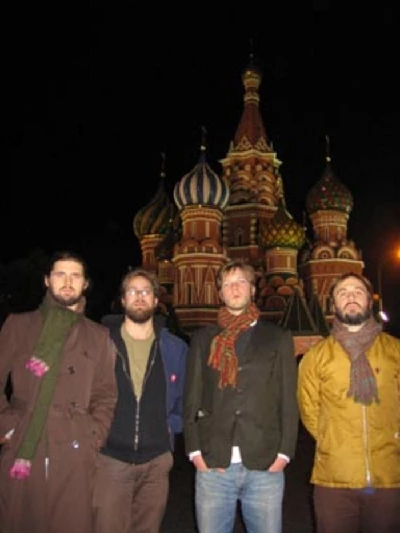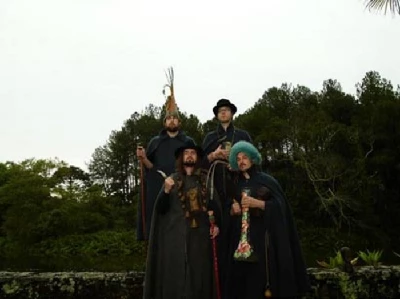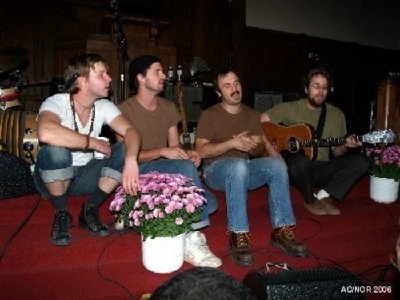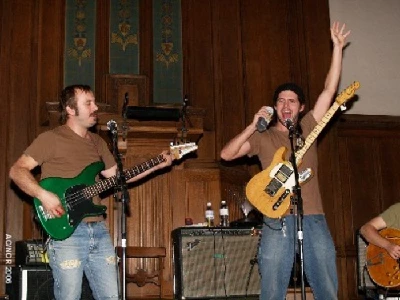published: 24 /
8 /
2007
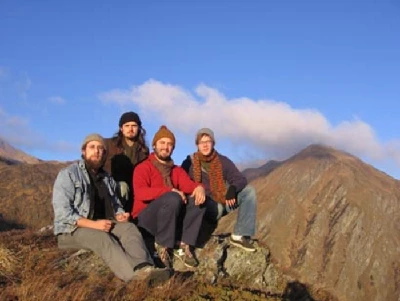
One of the rising bands of the alt. folk scene, Akron/family have recently released their fourth album, 'Love is Simple', on Michael Gira's Young God label to much acclaim. Sarah Johnson speaks to band members Ryan Vanderhoof and Seth Olinsky about it
Article
Sitting at one end of the long bench tables at Shoreditch's Cargo venue, Ryan Vanderhoof and Seth Olinsky of folk-y rock band, Akron/family seem excited for their gig with other band members, Miles Seaton and Dana Janssen, a couple of hours away. They last played in London about a year ago at the soon-to-be-no-more Spitz and it looks like tonight will be another packed out show. Already the venue is getting busy and there is a definite buzz in the air.
Akron/family have had a busy year touring and recording their latest album, 'Love is Simple'. The album comes after three intense years in which they have managed to release four albums after being signed to Young God Records by Angels of Light front man, Michael Gira.
A waitress hurries over and asks if we would like anything to eat. We all decline. The voice recorder clicks on and we get down to discussing the new album.
PB : You have released a record every year since your debut. Has that been difficult?
SO : The first record came out in 2005. We released two records that year ('Akron/family' and 'Akron/family & Angels of Light'-Ed), then one in 2006 ('Meek Warrior') and then one this year, so it’s kept us busy. But it’s also kind of felt like a long time for us with this record. With the first one a lot of stuff had been around before that time. Even some of the songs we did on the split album with Angels of Light was older, so for those albums we kind of had a backlog of material that we then took our time over recording. This new album is the first one we have written from scratch since writing that backlog of material.
PB : What direction do you think the new album has took?
RV : I’d say it’s a little more traditional rock/pop and has a lot more shorter songs. I think there are more three minute songs than there are seven minute songs. Before it was more of the five to seven minute range. It’s less like 'Meek Warrior' and more like elements of the first two albums combined.
PB : As a band you improvise a lot on stage. Do many songs come out of that?
RV : For this record we individually had time on our own, wrote music and then got together as a group and played the music for each other. We talked about what we liked and what we didn’t like and then started working on it together with each person kind of being a spokesperson for the song they brought to the table. But it’s always open for everyone to add their own parts and influence to.
PB : Are you all on a similar wavelength when you create music?
SO : Our influences and what we like overlaps a lot really. It’s very easy sometimes to focus on what’s different but I think our overlap is generally pretty compatible. Most of the time we see eye to eye with things. Sometimes one of us will have something that they want to explore, but it doesn’t really work in the whole picture, but generally it all comes together really well.
RV : There has been a development since we became a band. At first things didn’t overlap as much, but over the past few years we have come together more as we have gotton to know each other more. We understand each other’s views better and we have also evolved a group aesthetic. That kind of thing just develops over time.
SO : What’s funny is that we have this idea that everything seems so static to us but if you look at each record to the casual observer, especially if they don’t know us, they would probably think each recording sounded totally different.
PB : How do you translate the records and improvise so well on stage?
SO : Most of the time we don’t just improvise without any idea or direction. The majority of time it is parts of songs which are open. Some nights we do what we usually do, and some nights we go in a completely different direction. Sometimes it might lead fluently into another song.
RV : We have moments where we have pre-planned ‘openness’. It’s different for some gigs and more similar for others.
Last year when we played in Britain at the Spitz I remember there was a lot of improvising at that show. That was one where we would get to the open points and just keep going into something else. Those open sections can turn into something completely new. There’s kind of a ‘none talked about’ amount of time that we are going to be in that open space which is usually the same from night to night more or less, but with subtle differences. But for whatever reason, some nights there just seems to be more energy or more momentum for exploration and then we’ll get through that part and it will just organically go into some thing else. I think last time at the Spitz we kind of did that.
SO : Sometimes the crowd looses us, sometimes we loose ourselves but we’ve gotten to the point where we don’t force it. We just do it when it’s there.
PB : When you put together an album is it hard to strip down longer songs?
SO : It’s been different for each album. When we first started the majority of our songs were longer. They were more longwinded. Michael Gira was the producer on the first couple of records and his view was to make the songs shorter and more concise so he worked a lot with us specifically on editing, and we did need that. We were very vague but he heard the bits he liked and wanted to zone into that. It’s something I think we’ve gotten better at each record.
RV : t think with this latest record we were working on it so much that the process became part of our composing so when we started recording it already had most of the editing built in.
SO : We got to the point when we were rehearsing the album and thinking "if we were doing this live we’d have some open sections here". Everything was feeling a little bit too song orientated so we started thinking of how we could stretch this out a little bit or make it a bit more spacious. It kind of sets it up for the next song. We had tightened it up so much that we felt it needed a bit of openness.
PB : You have a lot of interesting noises and instruments on your albums. How do you find noises you like?
RV: We don’t really catalogue sounds and try and get them in to song. It’s usually the case that we are working on a song and think it needs a ‘something.’ Then someone will say "well what about this thing", or we’ll describe something, like, we need some thing that sounds sunnier and we’ll go about finding something in the room that creates that quality. It’s as if it’s a painting and we are trying to add a colour. Then we just kind of goof around with things and try and create that sound.
PB : What is one of the most unusual things you have used to get a sound out of?
SO : The first record had a lot more experimentation with sounds because it was recorded at home, so we could look around for stuff. We once used frozen broccoli. We crumpled it around in the microphone and then we wanted it to fly so we made it start in the right speaker and go all the way to the right speaker. So it was flying frozen broccoli.
The new record started with us and our instruments, just playing, so it’s a little more traditional. There are some sound effects that we got off the internet. Some monkeys and some jungle birds and stuff like that, but I don’t know if there are any weird sounds. The mouth trumpet maybe?
RV : Yeah he’s a really good mouth trumpeter (Seth starts a rendition of a mouth trumpet tune. It’s very authentic)
PB : Do you do that on stage as well?
SO : Not on stage. It's hard to get it into the microphone but I do it on the recording.
PB : Are you looking forward to going back to the US next week?
RV: Yeah we’re slowing down for the summer. We’re pretty much off for most of the summer and then in the fall when the next album comes out we start again.
PB : Does it feel like your more at home when you are touring America or is it so big that it still feels like you’re moving around different countries?
SO : I’m reading Woody Guthrie’s autobiography right now and it’s strange when you think that 80 years ago in America there was regionalism. The south was really a different culture from the north east and when you go back and listen to great American folk music a lot of it is regional, before TV and telephones took over. So I think it can be more similar to Europe in the sense that you go from one area to the other and the architecture changes and people change. Now to a certain extent regionalism is gone. It is not as unique as it used to be. The mini mall is everywhere and you’ve come to expect the same things every where you travel in America, But there are still some differences.
We tour America a lot and each time I feel I get to see more and more of the subtlety of the country. It’s an amazing place and that idea of a regional America is still there to a degree and I think we get to see it a lot more.
Because we are in a band, we are essentially doing something that not a lot of other people get to do. We don’t watch TV. We’re kind of separated. We just drive through the land and play for different people. So we get to see this wonderful side of America, for a few days you're in the mountains then two days later you can be in the desert and then two days later your in the south and it’s all lush and green. There is so much different geography its actually quite magical, but it’s also sad that many Americans don’t really get to know it. They look at TV and everyone sees the same Britney Spears, the same news and the same McDonalds.
RV : There seems to be a wanting in America to make it less regional. It seems like the norm to make it more general and more the same
SO : It’s the irony that capitalism almost ends up being like communism because companies get bigger and bigger and bigger and all of a sudden every body in America shops at Wall Mart, every one eats the same food and wears the same clothing.
PB : Do you enjoy all the travelling?
RV : Yeah, I think it’s beautiful. It opens up this whole other world like an America inside of America and it can be much better than the surface America you see on TV. It’s not always easy to see a lot of places when your touring but as we’ve now been to many places four or five times you get to see a lot more of them gradually
SO : Even in Europe as well, because we’ve seen these places a few times, you can take it in a bit more and feel like the country is more familiar.
RV : Touring is a very odd life. It can be a bummer in some ways but there is also something cool about living differently to everyone else.
PB : Does it ever feel a bit detached?
SO : When people ask us what new bands we like I always say I don’t know anything about new bands because we’re in a van all the time. We just hoard the same CDs that we bought in childhood.
PB : So what inspires you when you write if not new music?
RV : There’s not much new things that do, especially with this new album. I hear a lot more rock influences like Neil Young and the Beatles coming through. We’re on tour listening to that music so it filters through in our minds and all the other stuff we listen to like jazz and world music, it all gets filtered through and becomes something new.
SO : I think the older I get and the more music I do the less important the type of music we play is. It’s more about what that music does to people or to us. It’s like it is not about the clothing. We’ve come into this fashionable world of music but pretty soon people will realise that we’re just not that fashionable and I’m getting less and less so as I get older. What the music is saying or doing is getting way more important than the first thing you hear within the music.
PB : How did you all get together in 2005?
SO : I moved to New York to do a course in post modern literature and it was a pretty sheltered life at first, I just goofed off and ended up staying in New York. I worked a couple of jobs for a while but I couldn’t find any one to make music with that I connected with. Then I got a job at this coffee shop and a week before that Miles had just gotten the same job. He had moved to New York about a month after I had and he had had a similar experience. We were working together and then from there it went pretty quickly. I grew up with Dana so we convinced him to come over and play with us so a few months later we played in Ithaca and Ryan was there.
RV : I played a solo set before them and I was listening to them play and just thought the music was awesome, the most original stuff I had heard.
SO : Then the next morning we were sitting eating breakfast and just decided to create a band.
RV : For me it was the first band that I had been in where everyone was just 100% committed to making music and to making it our lives and our career.
SO : When Michael Gira first came out to see us it was a huge deal. I remember the first summer we came back from touring with Michael and we were all in a daze because we had been working so hard but then nothing really changed for us. It was almost as if you work so hard to make this really good record or have this great tour but afterwards you still have the same problems as everyone else, you still do the same things.
RV : It’s like you always want something bigger, so as soon as you’re on the first rung of the ladder you realise you actually want to be on the second. And that’s not just in music. It’s the way of the world.
But at the same time it was great because here we were in our early 20's getting signed which was what we really wanted. Some people can live their whole life and end up getting to be 80 years old without really doing the one thing they wanted or getting what they want out of life.
PB: Thank you.
Picture Gallery:-
